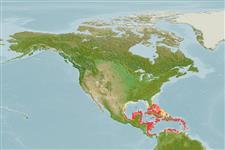Common names from other countries
分類 / Names
共通名の | 類義語 | Catalog of Fishes(部類, 種) | ITIS | CoL | WoRMS | Cloffa
>
Blenniiformes (Blennies) >
Dactyloscopidae (Sand stargazers)
Etymology: Gillellus: Theodore Nicolas Gill (1837-1914) researcher of abyssal fishes and systematics (Ref. 45335).
Environment: milieu / climate zone / depth range / distribution range
生態学
海 底生の. Tropical; - 9°N
Western Atlantic: southeastern Florida, USA and Bahamas to Panama.
サイズ / 重さ / 年齢
Maturity: Lm ? range ? - ? cm
Max length : 5.0 cm TL オス/雌雄の選別がない; (Ref. 7251)
簡単な記述
検索表 | 形態学 | 形態計測学
背面の脊椎 (合計) : 11 - 15; 背鰭 (合計) : 14 - 17; 肛門の骨: 2. Common amongst Dactyloscopidae: Small, elongate fishes. Head usually broad and deep, body tapering and compressed behind. Eyes on top of head, often protrusible; mouth moderate to large, oblique to vertical; jaw teeth minute, in 2 or more series; no teeth on roof of mouth (vomer and palatines). Opercular opening large, gill membrane free from isthmus; opercles membranous, large, usually overlapping on underside of head, typically fringed above with 2 to 24 fleshy fimbriae. Dorsal fin continuous, with an isolated or semi-isolated anterior finlet, or with 1 to 5 separate anterior rays; dorsal-fin spines 7 to 23; anal-fin spines 2; dorsal and anal fins free or united to caudal fin by fragile membranes; pectoral fins broad-based, usually enlarged in mature males; caudal-fin rays simple or branched; pelvic fins under throat (insertion anterior to pectoral-fin base), with 1 spine and 3 thickened segmented rays; all other rays simple. Head and venter naked, body elsewhere with large cycloid scales (smooth to touch); lateral line high anteriorly, deflecting ventrally behind pectoral fin to continue along middle of side to caudal-fin base where terminal lateral-line scale bears ventrally directed canal. Body coloration, variably pale to strongly pigmented with white, brown, or reddish; some forms with characteristic saddle-like bars crossing back; others plain, mottled, or with indications of lateral stripes. Species distinguished by: dorsal-fin origin on nape; with an isolated or semi-isolated anterior finlet. First preopercular canal not branched, with a single distal pore. Segmented caudal-fin rays usually 10. Arched lateral-line scales 22 to 33. Upper lip without fimbriae (Ref.52855).
Occurs in sand around rocks and patch reefs (Ref. 5521). Burrows in soft sandy bottom, where it waits for prey, with only the eyes, nose and mouth protruding.
Life cycle and mating behavior
Maturities | 繁殖 | Spawnings | Egg(s) | Fecundities | 幼生
Dawson, C.E., 1982. Atlantic sand stargazers (Pisces: Dactyloscopidae), with description of one new genus and seven new species. Bull. Mar. Sci. 32(1):14-85. (Ref. 27742)
CITES (Ref. 128078)
Not Evaluated
Human uses
用具
特記事項
XMLをダウンロードして下さい
インターネットの情報源
Estimates based on models
Preferred temperature (Ref.
115969): 26.4 - 28.2, mean 27.4 (based on 478 cells).
Phylogenetic diversity index (Ref.
82804): PD
50 = 0.5010 [Uniqueness, from 0.5 = low to 2.0 = high].
Bayesian length-weight: a=0.00389 (0.00180 - 0.00842), b=3.12 (2.94 - 3.30), in cm Total Length, based on all LWR estimates for this body shape (Ref.
93245).
栄養段階 (Ref.
69278): 3.9 ±0.6 se; based on size and trophs of closest relatives
Fishing Vulnerability (Ref.
59153): Low vulnerability (10 of 100).
